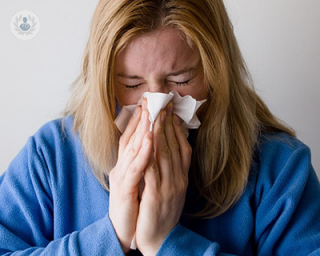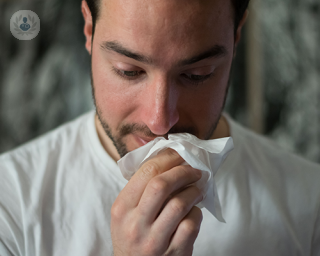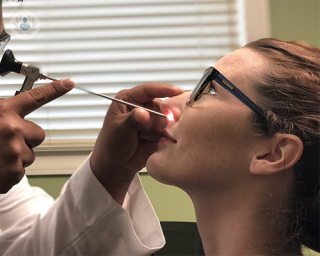Postnasal drip
What is postnasal drip?
 Mucus is produced by glands found in the throat, nose and airways and when these glands produce excess mucus it drips down the back of the throat. This build-up of mucus can become thick and cause discomfort - known as postnasal drip.
Mucus is produced by glands found in the throat, nose and airways and when these glands produce excess mucus it drips down the back of the throat. This build-up of mucus can become thick and cause discomfort - known as postnasal drip.
Postnasal drip is a very common occurrence and affects almost everyone at some point in their life.
What causes this?
The body’s immune system produces this excess mucus to fight off infections by moistening areas to trap and kill the foreign invaders, such as viruses and bacteria.
Usually, mucus mixes with saliva and drips down the back of your throat throughout the day without you even realising. But, when this mucus does become too thick it causes discomfort and annoyance for some people.
There are a number of reasons why the glands may produce excess mucus:
- The common cold or flu
- Allergies such as hay fever
- Sinus infections
- A foreign object stuck in the nose
- A deviated septum
- Medications
- Spicy food
- Chemical cleaning products or perfume smells
- Environmental fumes
- Cigarette smoke
Symptoms
The main symptom you experience is the sensation of mucus dripping down the back of the throat. But this can be accompanied by other symptoms such as:
- the feeling of nausea due to added mucus in the stomach
- a cough, especially at night
- bad breath
- sore throat
- a tickle in the throat
- a constant need to clear the throat
Treatment and medication
Most of the time, postnasal drip clears on its own. Rarely, complications occur, such as further infection of the sinuses, but you should treat the condition to avoid complications and relieve symptoms.
Over the counter medication is the most popular form of treatment. These include:
- Decongestant medication – this help dry out the mucus.
- Antihistamines – try to combat allergies from pollen or house dust by taking this medication.
- Mucus thinning medication – some people find relief in medication aimed at thinning the mucus.
- Nasal sprays – saline sprays use salt water to wash away the mucus build up. They also help clear blocked airways.
Home remedies
Home remedies are also popular and effective at treating postnasal drip.
Some people find their mucus build-up gets worse overnight, so propping up the head slightly higher than the rest of your body can prevent it.
Your body loses fluid when you have postnasal drip, so drinking plenty of liquids can help to thin the mucus and keep it flowing.
To combat postnasal drip caused by allergies, you could consider using anti-allergy covers on your bed, wash all your sheets and pillows in hot water and dust and vacuum more often.
When to see a doctor
If your mucus is discoloured and hasn’t cleared up after 10 days you should see a doctor and get a diagnosis. Having discoloured mucus, as well as a fever, might be a sign of a viral or bacterial infection and you may need the doctor to prescribe medication to help fight it.
If you start wheezing, find it difficult to breathe or you see blood in your mucus you should seek prompt medical advice.
What specialist should I see?
An otolaryngologist treats postnasal drip.







